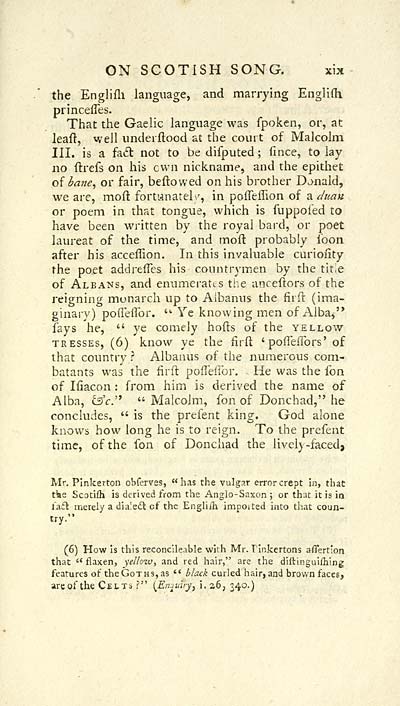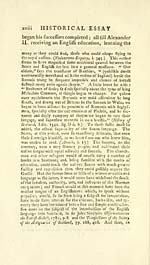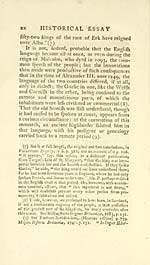Glen Collection of printed music > Printed music > Scotish song in two volumes > Volume 1
(31) Page xix
Download files
Complete book:
Individual page:
Thumbnail gallery: Grid view | List view

ON SCOTISH SONG. xix
the Englifh language, and marrying Englifh
princefles.
That the Gaelic language was fpoken, or, at
leaft, well underftood at the court of Malcolm
III. is a faft not to be difputed ; fince, to lay
no ftrefs on his own nickname, and the epithet
of bane, or fair, beftowed on his brother Donald,
we are, moft fortunately in pofleflion of a duau
or poem in that tongue, which is fuppofed to
have been written by the royal bard, or poet
laureat of the time, and moft probably ioon
after his acceflion. In this invaluable curioiity
the poet addrefles his countrymen by the title
of Albans, and enumerates the anceftors of the
reigning monarch up to Aibanus the fir ft (ima-
ginary) pofleflbr. "■ Ye knowing men of Alba,"
fays he, a ye comely hofts of the yellow
tresses, (6) know ye the fir ft 'pofTeflbrs' of
that country ? Aibanus of the numerous com-
batants was the firft pofleflbr. He was the fon
of Ifiacon : from him is derived the name of
Alba, tsfc." " Malcolm, fon of Donchad," he
concludes, " is the prefent king. God alone
knows how long he is to reign. To the prefent
time, of the fon of Donchad the lively-faced,
Mr. Pinkerton obferves, "has the vulgar error crept in, that
tke Scotifh is derived from the Anglo-Saxon ; or that it is in
fact merely a dialect cf the Engliih impoited into that coun-
try."
(6) How is this reconcileable with Mr. Tinkertons aflertion
that " flaxen, yellow, and red hair," are the diflinguifliing
features of the Goths, as " black curled hair,and brown faces,
are of the Celts ?" (En-wi/y, i. a6, 340.)
the Englifh language, and marrying Englifh
princefles.
That the Gaelic language was fpoken, or, at
leaft, well underftood at the court of Malcolm
III. is a faft not to be difputed ; fince, to lay
no ftrefs on his own nickname, and the epithet
of bane, or fair, beftowed on his brother Donald,
we are, moft fortunately in pofleflion of a duau
or poem in that tongue, which is fuppofed to
have been written by the royal bard, or poet
laureat of the time, and moft probably ioon
after his acceflion. In this invaluable curioiity
the poet addrefles his countrymen by the title
of Albans, and enumerates the anceftors of the
reigning monarch up to Aibanus the fir ft (ima-
ginary) pofleflbr. "■ Ye knowing men of Alba,"
fays he, a ye comely hofts of the yellow
tresses, (6) know ye the fir ft 'pofTeflbrs' of
that country ? Aibanus of the numerous com-
batants was the firft pofleflbr. He was the fon
of Ifiacon : from him is derived the name of
Alba, tsfc." " Malcolm, fon of Donchad," he
concludes, " is the prefent king. God alone
knows how long he is to reign. To the prefent
time, of the fon of Donchad the lively-faced,
Mr. Pinkerton obferves, "has the vulgar error crept in, that
tke Scotifh is derived from the Anglo-Saxon ; or that it is in
fact merely a dialect cf the Engliih impoited into that coun-
try."
(6) How is this reconcileable with Mr. Tinkertons aflertion
that " flaxen, yellow, and red hair," are the diflinguifliing
features of the Goths, as " black curled hair,and brown faces,
are of the Celts ?" (En-wi/y, i. a6, 340.)
Set display mode to: Large image | Transcription
Images and transcriptions on this page, including medium image downloads, may be used under the Creative Commons Attribution 4.0 International Licence unless otherwise stated. ![]()
| Special collections of printed music > Glen Collection of printed music > Printed music > Scotish song in two volumes > Volume 1 > (31) Page xix |
|---|
| Permanent URL | https://digital.nls.uk/90267591 |
|---|
| Shelfmark | Glen.84 |
|---|---|
| Additional NLS resources: | |
| Attribution and copyright: |
|
| Description | Scottish songs and music of the 18th and early 19th centuries, including music for the Highland bagpipe. These are selected items from the collection of John Glen (1833 to 1904). Also includes a few manuscripts, some treatises, and other books on the subject. |
|---|
| Description | The Glen Collection and the Inglis Collection represent mainly 18th and 19th century Scottish music, including Scottish songs. The collections of Berlioz and Verdi collected by bibliographer Cecil Hopkinson contain contemporary and later editions of the works of the two composers Berlioz and Verdi. |
|---|

